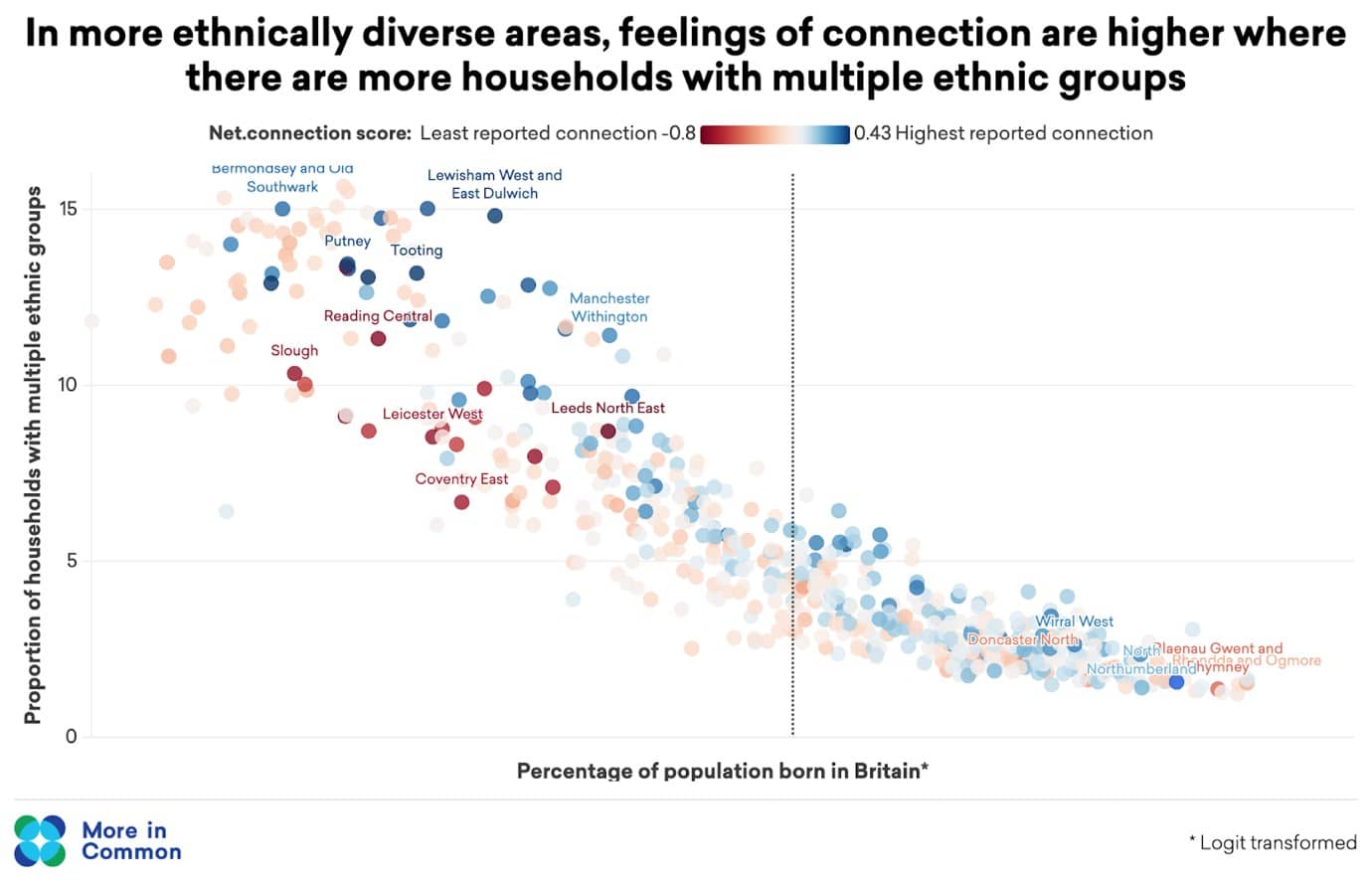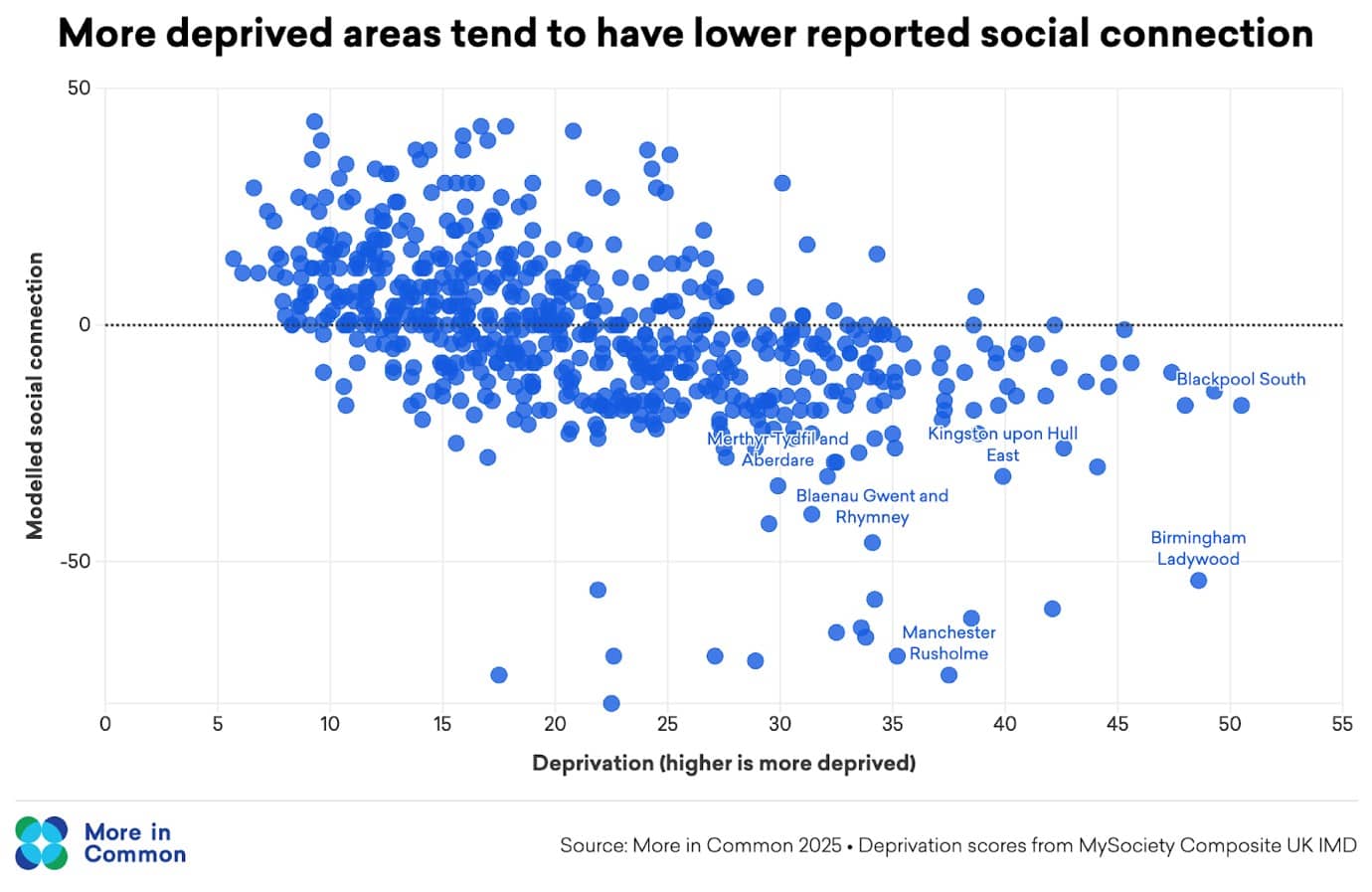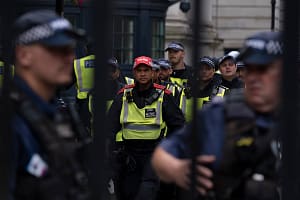One year on from the riots This Place Matters from Citizens UK, UCL Policy Lab, and More in Common is publishing major in-depth research into the social dynamics behind the unrest.
This new report suggests that the growing sense of social dislocation was a key driver of the 2024 riots and remains a serious concern for the future.
The analysis reveals that, while levels of community connection vary significantly across the country, constituencies experiencing unrest tend to exhibit lower levels of social connection.
This is underlined by the fact that integration, not immigration, is key to understanding the 2024 riots, with deprivation having a clear impact, where post-industrial communities and those feeling neglected struggle with their subjective sense of social connection.
Integration, not immigration, is key to understanding the 2024 riots
Contrary to popular assumptions, social disconnection is not strongly linked to immigration levels or ethnic diversity alone. Our research finds no consistent correlation between high immigration and low cohesion. Instead, what matters is integration.

Areas with high rates of multi-ethnic households- a good proxy for inter-ethnic mixing- tend to report stronger feelings of connectedness and were less likely to have experienced unrest in summer 2024. However, where different communities live parallel but separate lives, feelings of mistrust and alienation are more common.
And so, public concern about integration is rising. Two in five Britons now see a divide between immigrants and those born in the UK as one of the country’s most significant, up 15 points since 2022. Our focus groups reveal a growing perception that some newcomers fail to respect British laws, customs, and language, further fueling divisions.
“Integration, it’s like, yeah, if you do come to the UK, integrate, whereas a lot of these people don’t want to. They want to stay in their own community.”
– Dave, builder, Helsby
However, there is clear public support for a shared focus on integration, involving migrants, long-time residents, and government alike- provided it is backed by real investment.
Deprivation and community bonds

But concerns around integration are only one part of the picture. Many of the areas that experienced unrest in 2024- regardless of their ethnic makeup- face deep and longstanding economic challenges. Residual anger around these areas being ‘left behind’ by successive governments was a key catalyst in the spilling over of anger in 2024.
In post-industrial towns and cities, particularly across the North East and North West, the collapse of heavy industry and the erosion of social infrastructure have weakened community ties. In places like Sunderland, Citizens UK found that residents directly link inequality and poverty to unrest and societal breakdown.

Despite over a decade of talk about ‘tough choices’ and austerity, many in these communities have seen little improvement in their lives. Instead, in their view, they continue to bear the brunt of the cost of living crisis- while government funding on projects such as asylum hotels reaches record levels:
- 43% say economic growth makes no difference or is bad for people like them.
- 50% say they don’t believe the cost of living crisis will ever end.
With community spaces- from sports clubs to pubs- closing at record rates, many no longer have affordable places to gather or connect. This has further weakened the associational bonds that once gave communities a sense of shared identity and mutual support, and only sped up the breakdown in relations that led to violence in 2024.
Marc Stears, Director, UCL Policy Lab, said, “The Deputy Prime Minister recently noted the profound challenges facing communities right across the country and our This Place Matters research confirms those concerns. It will take an enormous effort across all of society for many years to address these. The country needs root-and-branch renewal. Most of all, people from all regions and all backgrounds need to feel that they have a real role to play in reshaping its future. For too long, millions of people have felt locked out of opportunity, looked down upon and disrespected by those who are in charge.”
Luke Tryl, Director, More in Common, said, “Last year the country was rocked by riots, and while they abated, it’s clear the causes and underlying factors that motivated the riots haven’t. Unless we are serious about tackling them, we risk further waves of unrest. Our research shows that where integration breaks down and deprivation deepens, communities fracture. The data is clear- it’s overly simplistic just to say that immigration fuels unrest. Instead, it’s a combination of failures of integration, lack of connection, community engagement, trust and opportunity that fuels unrest. If we want to prevent future riots, we need to restitch the social fabric of our communities.”
Matthew Bolton, Executive Director, Citizens UK, added, “There is a dangerous breakdown of trust between people and their politicians, national institutions and perceived elites. Any successful drive towards a more cohesive society needs to come from trusted local leaders who can help shift their neighbours’ feelings of anger and frustration about a broken system and channel it towards community change. Through our local listening and polling, we’re building a package of policies including crime and public safety, changes to refugee resettlement, and decent housing and jobs, that together can start to rebuild that trust and relationship.”





Leave a Comment